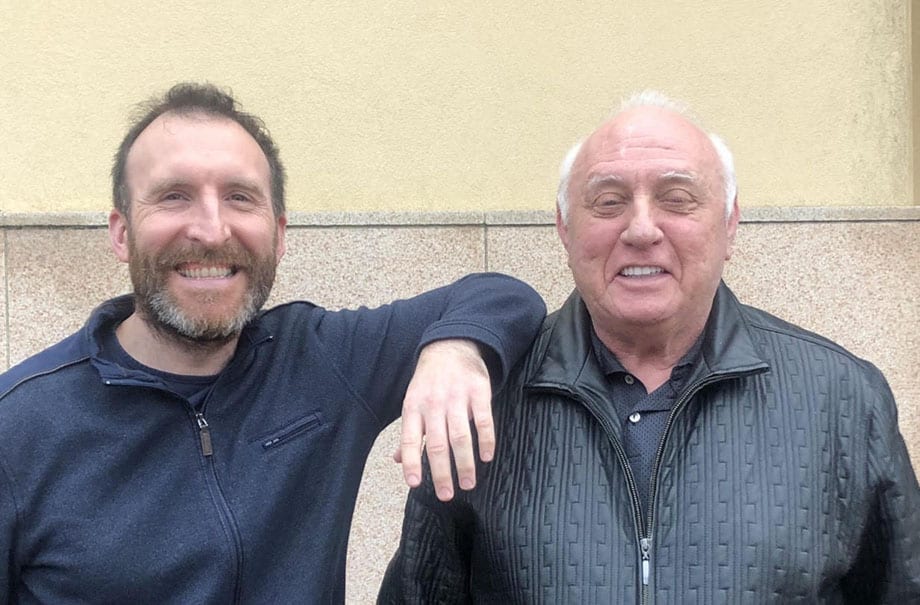Hi there,
What’s the Story?
South Africa has been a blast. It’s been great getting back to my adventures again with plenty more stories to tell!! This week I get to spend some time with family for once which will be a nice break.
This week’s episode of Changing Minds stars the work of Adam Grant as I walk you through the best bits from his books Hidden Potential and one of my favorite books out there: Think Again!! You can check it out here: video.owenfitzpatrick.com.
In this week’s Inner Propaganda, I explore the world of ‘canceling’ and offer some thoughts on what it’s all about.
__________________
Understanding Cancel Culture
Estimated reading time: 10 minutes 14 seconds
In the Jehovah’s Witnesses religion, there is a practice called “disfellowshipping,” where members who are deemed to have committed serious offenses and who fail to show the required repentance are formally excluded from the congregation. They are often ostracized by other members, including their own family members.
Similarly, the Amish community also practices a form of shunning known as “Meidung,” which can vary in intensity depending on the specific community and the offense. Both of these examples could be described as a form of ‘canceling’ a person because of their behavior.
Cancel Culture
Cancel culture is the culture whereby an effort is made to delete all and every bit of impact that a person has because of something they have said. If they did something wrong, we cancel them and do whatever we can to remove them from public consciousness forever.
In this week’s edition of Inner Propaganda, I want to dive into this concept and explore why it exists when it can be good when it can be bad, and what may be a better approach when we encounter people that we believe do not deserve to be listened to.
Canceling someone has become associated with people with left-leaning beliefs, but there are plenty of examples from both sides. The practice often uses social media to try to destroy a person’s career.
There are other canceling strategies, however. The burning of books is a good example of canceling authors. The Nazis did it. The Communists did it. The religious did it. Tearing down statues is another example of this kind of approach.
Today, it could be argued that we live in a ‘cancel culture’. What’s important to note, however, is that most of the canceling is coming from a small group of loud people.
Why Do We Cancel People?
There are many reasons why we cancel people. The idea itself is simple.
In the example I gave in the religions above, a member of the group is shunned. They are ignored to make sure nobody else commits the same offense. In ancient times, rule breakers were often banished from the kingdom and forced to live in exile.
Of course, that wasn’t the worst thing that could have happened to you. It was better than torture and an agonizing death. Nonetheless, while it didn’t end their life, it ended their ‘life’. Our lives include the people we live with and the communities we are a part of. When we are left out, it can be devastating.
Canceling is the modern equivalent of shunning and banishing.
The Good Intentions Behind Canceling
It is important to examine both sides of the practice before we tackle the problems with this process.
There are some good intentions to it:
1. We make an example of a person who engages in a certain behavior so that they do not engage in that behavior again.
While prison is our other means of doing this, sometimes a person will be guilty of something that isn’t against the law. To ensure that this non-legal law is enforced, we demonstrate a zero-tolerance policy for that behavior. We can’t send them to prison so we can ruin their lives instead.
2. Hate speech has a real impact.
Language has power. If people are allowed to get away with saying hate-filled things, then more people will do it and more people will be hurt as a result. We must protect those people who are vulnerable to language that demonizes, vilifies, or victimizes them.
3. Canceling can help bring about much-needed change.
The huge impact of social media across the globe on revolutions, elections, and starting movements cannot be overstated. When Saddam Hussein finally was murdered, his statue was toppled. Who would have argued with this? There is a good reason why the people in Iraq would not have wanted to walk past a statue of this mass-murdering dictator every day.
The same logic is used by those who desecrated and destroyed the statues of a number of different historical figures over the last few years. If we want society to change, we must be prepared to cancel the toxic elements from the past so we can be free for a brighter future.
While each of these reasons makes sense, there are several other, more nefarious reasons why people cancel.
The Bad Intentions Behind Canceling
There are a number of bad intentions behind canceling:
1. Virtue signaling.
When we cancel someone, we are declaring to the world, “Look how bad this person is,” while simultaneously suggesting, “Look how great I am.” We demonize others so we can glorify ourselves.
2. Power playing.
When we cancel someone, we are removing their power and demonstrating our own power. This makes us feel good feeling powerful.
3. Controlling the world.
We determine who and what gets canceled, so we exert control over the world and force everyone else to dance to our tune.
4. Revenge.
When we feel bullied or disenfranchised by someone in some way, it is natural to want them to get their comeuppance. The desire for revenge can drive the need to cancel but it masquerades as the virtue of caring. We can convince ourselves we are doing good when we are just getting even.
5. They’re on the wrong side.
This is another horrible reason for canceling. We cancel someone because they are on the wrong side and we finally have dirt on them. We tell people how smart we are ‘I knew it’.
We pretend we were on their side. ‘I used to have a lot of respect for them but now…’. We do whatever we can to destroy them while we don’t seem to have nearly as much passion to go after those on our side with the same skeletons in our closet.
6. It makes us bond with other cancelers.
When we cancel someone, we are usually jumping on a bandwagon with others who are doing the same thing. We are part of a movement, which makes us feel wonderful. It gives us meaning and a sense of identity as part of a group that is on the ‘right side’ of an issue.
The Two Sides of Cancel Culture
With this in mind, if we are not to cancel anymore, what’s the answer?
Like so many different topics, cancel culture has its two sides. There are the professional cancelers who LOVE canceling and want to cancel as many people as possible. They are the X police, and they have their fingers on their keyboards, ready to start their own wars and show their power.
You also have the free speech advocates who use the term ‘You can’t say anything these days’ to justify saying anything and actually being offensive and hurtful. I have found myself guilty of uttering these words in moments where I have been dismayed by what I felt was ridiculous political correctness.
The way I reckon with this is by disagreeing with the generalization of the policy and agreeing with its positive intentions. I am attempting to have a nuanced view.
I believe the policy of burning books is a very bad idea. The policy of destroying and desecrating statues is mostly a bad idea. The idea of canceling people is mostly a bad idea. Why?
We live in a world where everyone has the opportunity to get attention. It doesn’t matter what your views are; you will have an audience. If you happen to have malevolent views that promote hatred and discrimination and destroy lives through your ideas, that is a problem.
The truth is that the world is not full of critical thinkers. So many people are easily manipulated by propagandists who have mastered the art of persuasion.
As such, we can be led to believe all sorts of things. Many of them can be fundamentally harmful and wrong on so many levels. History is full of examples of a group of people being demonized because of who they are.
Consider Rwanda, South Africa, Northern Ireland, and Palestine. Consider antisemitism, Islamophobia, slavery, racism, homophobia, transphobia, and misogyny.
There needs to be a way to safeguard those who might be vulnerable to attack from powerful communicators with dangerous ideas. Yet the next challenge is who polices the police? Who says what a dangerous idea is?
While I don’t have an answer to that, I believe that we need to be much more careful in what we do in these situations.
Canceling someone because we get caught up in the virtue signaling and group bonding feeling while getting off on the feeling of power and control is a bad sign.
I would suggest that it is a sign not to cancel. We have to be honest with ourselves about this. Why are we trying to ruin this person?
The wrong answer is that they deserve it. The right answer is if we genuinely believe that their platform may provide them with an opportunity to destroy lives through toxic ideas they can spread to a large amount of people. If we feel that this would prevent vulnerable people from experiencing pain.
There are right reasons and wrong reasons to want to cancel. Even so, I believe that there are still better alternatives.
The Alternative to Cancel Culture
Imagine your child is getting bullied. As a solution, you take your child out of that school. This is not a good plan for two reasons.
One, nobody learns lessons, and the bully will just find someone else to pick on.
Two, your child may well get bullied all over again by someone else.
Let’s take a second approach. You take the bully out of the school. This is also not a good plan.
For two reasons.
It may or may not stop the bully from bullying in the future.
Secondly, your child has learned nothing and may well get bullied again in the same school.
My point is that canceling someone just means we have reduced their platform.
When somebody gets canceled they don’t usually think:
‘I was wrong. I deserved that. I will change my ways.’
Even if they publicly state that they don’t usually think that, and many of their followers also don’t usually think that.
The person being canceled usually thinks:
‘That’s so unfair. The cancel culture is trying to come for me. They don’t like the fact that I’m speaking the truth.’
The fact that you are trying to silence them serves them with the perfect example of you being part of a conspiracy to shut them up.
They will often mentally defend themselves. Even if they accept they are guilty, they will usually minimize it or make excuses for it.
When I say burning books is always a bad idea, I am suggesting that this leads to a slippery slope whereby we can just burn all the books of the people we don’t agree with.
So, in essence, those in power can destroy our exposure to alternative ideas, and that risks us living in a dictatorship.
When I say destroying monuments or statues is mostly a bad idea, the reason I am leaving some room for it is because of some extreme examples like the Saddam Hussein one I mentioned earlier.
When monsters like Hussein, Hitler, or Pol Pot have statues erected to themselves, it’s hard to argue against them being taken down.
In many ways, you could argue that there is a symbolic function to the destruction of such pieces of stone that provides a population with a much-needed cathartic reaction to their collective trauma.
However, many of the historical statues that are desecrated are done so not necessarily in service of a much-needed catharsis but more likely as a result of groupthink and a fever of excitement that became contagious inside a virtue-signaling movement.
Let’s tear this down because we can, it’s fun, and it makes us look benevolent.
The same is true of canceling. I believe that canceling itself should be the very last resort and only used if there is a real and present danger of that person using their platform to convince many of their followers to attack another group.
A New Approach
Instead of attacking a person, we need to get better at attacking their ideas.
We need to understand how persuasion works. Like the bullying example, you don’t convince someone’s followers not to follow by canceling that person.
You must understand why they follow and work on getting through to them.
This means finding ways to become a more effective storyteller than them.
It means understanding their argument and point of view and becoming better at explaining clearly, convincingly, and in a compelling way why they are wrong.
It means leveraging logical and emotional appeal to change the minds of their followers.
To do so, however, we need to beat them properly, not disallow them from playing the game. Why? Doing so feeds into what they want and prevents us from accomplishing what we want.
I believe that we need to stop demonizing people because they make mistakes or say dumb things.
We need to stop demonizing people because they are trying to shut someone’s platform down. Instead, we need to look at the intentions. Why are we doing it?
Are we trying to make the world a better place or do we actually enjoy canceling somebody?
If we are honest about the answer and we are trying to make things better, then a follow-up question:
Is there a better way that we could do that?
Could we actually give ourselves a chance to get through to those who believe differently from us?
To me, that would be a huge step in the right direction.
____________________
The Brain Prompt
Do a CANCEL audit.
What are the kinds of sources, information, ideas, or content that you no longer want in your life?
What will you replace it with?
How will you do that, starting now?
For more insights, subscribe to my weekly newsletter (owenfitzpatrick.com/newsletter).
Cheers,
Owen.
P.S. Tune in to the Changing Minds podcast this week to learn more about the fascinating work of Adam Grant: check it out here.





